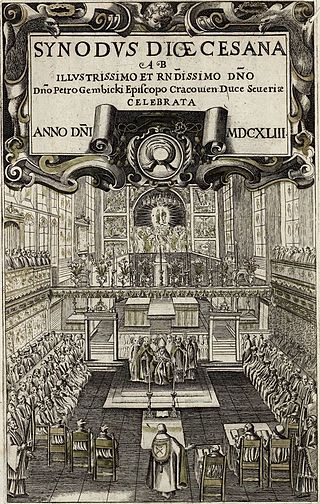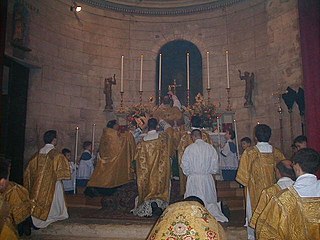
A synod is a council of a Christian denomination, usually convened to decide an issue of doctrine, administration or application. The word synod comes from the Ancient Greek σύνοδος 'assembly, meeting'; the term is analogous with the Latin word concilium'council'. Originally, synods were meetings of bishops, and the word is still used in that sense in Catholicism, Oriental Orthodoxy and Eastern Orthodoxy. In modern usage, the word often refers to the governing body of a particular church, whether its members are meeting or not. It is also sometimes used to refer to a church that is governed by a synod.
Full communion is a communion or relationship of full agreement among different Christian denominations or Christian individuals that share certain essential principles of Christian theology. Views vary among denominations on exactly what constitutes full communion, but typically when two or more denominations are in full communion it enables services and celebrations, such as the Eucharist, to be shared among congregants or clergy of any of them with the full approval of each.
In religious organizations, the laity consists of all members who are not part of the clergy, usually including any non-ordained members of religious orders, e.g. a nun or a lay brother. In both religious and wider secular usage, a layperson is a person who is not qualified in a given profession or does not have specific knowledge of a certain subject. The phrase "layman's terms" is used to refer to plain language that is understandable to the everyday person, as opposed to specialised terminology understood only by a professional.

Vestments are liturgical garments and articles associated primarily with the Christian religion, especially by Eastern Churches, Catholics, Lutherans, and Anglicans. Many other groups also make use of liturgical garments; among the Reformed (Calvinist) Churches this was a point of controversy in the Protestant Reformation and sometimes since, in particular during the ritualist controversies in the Church of England in the 19th century.

The Greek Orthodox Patriarchate of Jerusalem, also known as the Greek Orthodox Church of Jerusalem, is an autocephalous church within the wider communion of Eastern Orthodox Christianity. Established in the mid-fifth century as one of the oldest patriarchates in Christendom, it is headquartered in the Church of the Holy Sepulchre in Jerusalem and led by the patriarch of Jerusalem, currently Theophilos III. The patriarchate's ecclesiastical jurisdiction includes roughly 200,000 to 500,000 Orthodox Christians across the Holy Land in Palestine, Jordan and Israel.

A clerical collar, clergy collar, or, informally, dog collar, is an item of Christian clerical clothing.

A pectoral cross or pectorale is a cross that is worn on the chest, usually suspended from the neck by a cord or chain. In ancient history and the Middle Ages, pectoral crosses were worn by both clergy and laity. By the Late Middle Ages, the pectoral cross came to be a special indicator of position worn by bishops. In the Roman Catholic Church, the wearing of a pectoral cross remains restricted to popes, cardinals, bishops and abbots. In Eastern Orthodox Church and Byzantine Catholic Churches that follow a Slavic Tradition, priests also wear pectoral crosses, while deacons and minor orders do not. The modern pectoral cross is relatively large, and is different from the small crosses worn on necklaces by many Christians. Most pectoral crosses are made of precious metals and some contain precious or semi-precious gems. Some contain a corpus like a crucifix while others use stylized designs and religious symbols.
Independent Catholicism is an independent sacramental movement of clergy and laity who self-identify as Catholic and form "micro-churches claiming apostolic succession and valid sacraments", in spite of not being affiliated to the historic Catholic church, the Roman Catholic church. The term "Independent Catholic" derives from the fact that "these denominations affirm both their belonging to the Catholic tradition as well as their independence from Rome".
Hellenic College Holy Cross Greek Orthodox School of Theology (HCHC) is an Orthodox Christian liberal arts college and seminary in Brookline, Massachusetts. Its mission is to educate individuals for life and service in the Orthodox Christian community; this includes men preparing for the priesthood of the Greek Orthodox Archdiocese and other Orthodox Christian entities, as well as men and women for leadership roles in the church or within secular society. HCHC includes a graduate school of theology (seminary) for clerical training and education, and several undergraduate and certificate programs in business, education, literature, and other secular professions. The institution was founded in 1937 as Holy Cross Theological School in Pomfret, Connecticut, but was moved to Brookline, Massachusetts in 1947.

Communion under both kinds in Christianity is the reception under both "species" of the Eucharist. Denominations of Christianity that hold to a doctrine of Communion under both kinds may believe that a Eucharist which does not include both bread and wine as elements of the religious ceremony is not valid, while others may consider the presence of both bread and wine as preferable, but not necessary, for the ceremony. In some traditions, grape juice may take the place of wine with alcohol content as the second element.

St Andrew's Greek Orthodox Theological College is an Eastern Orthodox Christian seminary and theological college located in Redfern, a suburb of Sydney, New South Wales, Australia. The college is a member institution of the Sydney College of Divinity, a federation of theological educational institutions each operated by different Christian denominations. It is the only accredited Eastern Orthodox tertiary institution of its kind in the Southern Hemisphere and its teaching and practice are administered via the Greek Orthodox Archdiocese of Australia.
A calling, in the religious sense of the word, is a religious vocation that may be professional or voluntary and, idiosyncratic to different religions, may come from another person, from a divine messenger, or from within oneself.
Following the October Revolution of 1917, the Bolshevik seizure of power led to the Russian Civil War which continued until 1922. The victory of the Bolshevik Red Army enabled them to set up the Union of Soviet Socialist Republics (USSR). Throughout the civil war various religions, secularists and anti-clericalists of the Bolsheviks played a key role in the military and social struggles which occurred during the war.

The soleas is an extension of the sanctuary platform in an Eastern Orthodox temple. The soleas projects beyond the iconostasis, forming a narrow walkway running the full length of the iconostasis.
Presbyter is, in the Bible, a synonym for bishop (episkopos), referring to a leader in local church congregations. In modern Eastern Orthodox usage, it is distinct from bishop and synonymous with priest. Its literal meaning in Greek (presbyteros) is "elder".
John IX Agapetos or Hieromnemon was Ecumenical Patriarch of Constantinople between 1111 and 1134. John's nickname is because before his election to the Patriarchal throne he held the office of hieromnemon within the Patriarchate. He was the nephew of a prominent Metropolitan of Chalcedon.
Local Council of the Russian Orthodox Church is an assembly of bishops and other clergy and laity, and sometimes, the local church, or surrounding areas for discussion and resolution of issues and affairs, doctrine, religious and moral life, device management, and discipline.
The 1988 Local Council of the Russian Orthodox Church was the fourth in modern history of the Russian Orthodox Church. It was held June 6 to 9, 1988 at the Trinity-Sergius Lavra in the Refectory Church. It was held in connection with the 1000th anniversary of the Christianization of Rus'. The most important outcome of the Council was the adoption of a new charter of the Russian Orthodox Church and the canonization of nine prominent representatives of the Russian Orthodoxy. At the council in 1988, in contrast to the councils in 1945 and 1971, the debate on ecclesiastical order at various levels had been very busy, sometimes acute; often, members of the council expressed diametrically opposed opinions.
The Indonesian Orthodox Church is a diocese which has been under the jurisdiction of the Church of the Genuine Orthodox Christians of Greece since 2019. The theology and praxis of the church is essentially the same as any other Eastern Orthodox Church, though they are not in communion with the larger body of Eastern Orthodox Christians. The legal entity of the Indonesian Orthodox Church was founded and is still managed in day-to-day affairs by Daniel Bambang Dwi Byantoro, and its history is in many ways inseparable from his own.

The Arab Orthodox Movement is a political and social movement aiming for the Arabization of the Greek Orthodox Patriarchate of Jerusalem, which has jurisdiction over the Orthodox communities of Palestine, Israel and Jordan, to which most Christians in the region belong.









